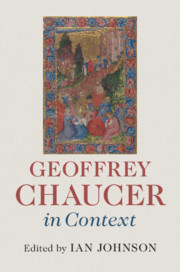Book contents
- Geoffrey Chaucer in Context
- Geoffrey Chaucer in Context
- Copyright page
- Contents
- Illustrations
- Contributors
- Abbreviations
- Introduction
- Part I Chaucer as Context
- Part II Books, Discourse and Traditions
- Part III Humans, the World and Beyond
- Part IV Culture, Learning and Disciplines
- Part V Political and Social Contexts
- Chapter 34 Dissent and Orthodoxy
- Chapter 35 The Church, Religion and Culture
- Chapter 36 England at Home and Abroad
- Chapter 37 Chaucer’s Borders
- Chapter 38 Rank and Social Orders
- Chapter 39 Chivalry
- Chapter 40 Chaucer and the Polity
- Chapter 41 The Economy
- Chapter 42 Towns, Villages and the Land
- Chapter 43 London’s Chaucer
- Chapter 44 Everyday Life
- Chapter 45 Household and Home
- Chapter 46 Marriage
- Chapter 47 Dress
- Part VI Chaucer Traditions
- Further Reading
- Index
Chapter 41 - The Economy
from Part V - Political and Social Contexts
Published online by Cambridge University Press: 24 June 2019
- Geoffrey Chaucer in Context
- Geoffrey Chaucer in Context
- Copyright page
- Contents
- Illustrations
- Contributors
- Abbreviations
- Introduction
- Part I Chaucer as Context
- Part II Books, Discourse and Traditions
- Part III Humans, the World and Beyond
- Part IV Culture, Learning and Disciplines
- Part V Political and Social Contexts
- Chapter 34 Dissent and Orthodoxy
- Chapter 35 The Church, Religion and Culture
- Chapter 36 England at Home and Abroad
- Chapter 37 Chaucer’s Borders
- Chapter 38 Rank and Social Orders
- Chapter 39 Chivalry
- Chapter 40 Chaucer and the Polity
- Chapter 41 The Economy
- Chapter 42 Towns, Villages and the Land
- Chapter 43 London’s Chaucer
- Chapter 44 Everyday Life
- Chapter 45 Household and Home
- Chapter 46 Marriage
- Chapter 47 Dress
- Part VI Chaucer Traditions
- Further Reading
- Index
Summary
Chaucer, writing for an upper-class audience, satirises the productive base of society, peasants and cottagers, by idealising their frugality and sense of social duty, leaving the reader to contrast these qualities with their perceived selfish acquisitiveness. In dealing with the landed aristocracy, the poet criticises them (without irony) for their exploitation of their tenants, and reminds them satirically that the managers of their landed estates were cheating them. Landed magnates and gentry were engaged in mundane routines of land management, and Chaucer indulges their escapist fantasy of living in ideal places, man-made paradises in gardens and parks. The economy depended on rural production envigorated by commerce, especially with industrial growth after 1350. Chaucer, himself a townsman, wrote about the traders and professionals who functioned in a complex urban environment. He refers to money, credit and contracts, and some of his plots hinge on bargains made and broken.
Keywords
- Type
- Chapter
- Information
- Geoffrey Chaucer in Context , pp. 346 - 354Publisher: Cambridge University PressPrint publication year: 2019

